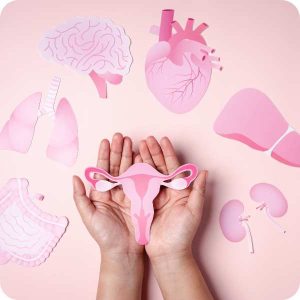 When pregnant with my first, I couldn’t walk properly, my back and shoulder hurt, and while pregnancy is far from an illness, my body generally felt unwell. Communicating all these grievances to my Dutch midwife didn’t get me far: “you’re pregnant, what do you expect?”, until finally, I had a nasty fall and was finally referred to a women’s health physio. Game changer!
When pregnant with my first, I couldn’t walk properly, my back and shoulder hurt, and while pregnancy is far from an illness, my body generally felt unwell. Communicating all these grievances to my Dutch midwife didn’t get me far: “you’re pregnant, what do you expect?”, until finally, I had a nasty fall and was finally referred to a women’s health physio. Game changer!
While pregnancy can be full of discomforts for some of us, there are things that shouldn’t be brushed off as ‘normal’. As a women’s health physiotherapist, Carolyn Sultana helps expectant and new mums deal with pelvic and lower back pain, diastasis recti, and the management of perineal and c-section scars. During our chat, Carolyn talks about the role of a women’s health physio, the many instances a physio can assist, even outside of pregnancy, and how she can help you regain your strength back post-birth. Check it out below!
What is a women’s health physio?
A women’s health physiotherapist or a pelvic health physiotherapist can assist women through the different stages in life. A women’s health physio has expert knowledge regarding conditions specific to females and understands the complex and unique female anatomy, including the female hormone system. The therapist understands the effects pregnancy, childbirth and menopause have on women. Other conditions, such as endometriosis can also require the help of a women’s health physio. Women’s health physiotherapy helps treat women’s health issues such as incontinence, pelvic/vaginal pain, prenatal and postpartum musculoskeletal pain, osteoporosis, rehabilitation following breast surgery, lymphoedema, education, prevention, wellness and exercises for different situations a woman might encounter.
Outside pregnancy, when would you see a women’s health physio?
 Women might require the assistance of a pelvic floor physio at different stages of life. This is because our pelvic floor can cause issues even without pregnancy. One such example is the very common but rarely spoken of complaint of sexual pain. Sexual pain or dyspareunia is possible even without ever having been pregnant. Such pain is most often coming from an overactive pelvic floor that is not flexible enough to deal with daily function effectively. When a woman has a tight or overactive pelvic floor she might also find difficulty initiating a pee, problems with flow, pain on holding on to a pee or pain during peeing. Tight muscles make bladder and bowel emptying difficult, leaving the person with a feeling of incomplete emptying.
Women might require the assistance of a pelvic floor physio at different stages of life. This is because our pelvic floor can cause issues even without pregnancy. One such example is the very common but rarely spoken of complaint of sexual pain. Sexual pain or dyspareunia is possible even without ever having been pregnant. Such pain is most often coming from an overactive pelvic floor that is not flexible enough to deal with daily function effectively. When a woman has a tight or overactive pelvic floor she might also find difficulty initiating a pee, problems with flow, pain on holding on to a pee or pain during peeing. Tight muscles make bladder and bowel emptying difficult, leaving the person with a feeling of incomplete emptying.
On the other hand, the pelvic floor can also be weak and a woman can start developing symptoms of incontinence, both urinary and faecal at any stage of her life. Pregnancy and childbirth do increase this possibility, however most women start being troubled mostly by these symptoms at menopause. Therefore the women’s health physio can guide patients to rehabilitate and strengthen their muscles to stop the annoying leaks.
More about when you should see a women’s health physio
Other symptoms related to bladder function can be urgency and urge urinary incontinence with increased urinary frequency. These are all common but not normal nor acceptable symptoms and should be managed.
Osteopenia and osteoporosis are also conditions that require expert advice regarding exercise and bone loading.
Pelvic organ prolapse, meaning the lowering of the bladder, uterus or bowel can occur as a result of childbirth but not exclusively. Such symptoms can also be the result of long term heavy lifting, persistent coughs or long term straining on the toilet. Such situations would require strengthening of the pelvic floor muscles.
It is advisable for women preparing to have pelvic surgeries, such as a hysterectomy, to seek advice from a women’s health physio in preparation of the pelvic floor for surgery and to continue training of the pelvic floor post surgery.
When a woman suffers from long term straining when emptying the bowels, it would be beneficial to have the pelvic floor muscles checked as it is these muscles that need to relax and lengthen to allow for stools to be evacuated. If the person feels the need to empty but after opening the bowels there is always a nagging sensation of incomplete emptying, there is a chance that the pelvic floor muscles are not relaxing enough and require physiotherapy.
Following breast surgery women require the services of a physiotherapist for managing range of motion of the shoulder, scar management and prevention of lymphoedema and strengthening of muscles around the shoulder.
When should a person visit a women’s health physio post birth and why?
 Women’s health physiotherapy can be started from pregnancy.
Women’s health physiotherapy can be started from pregnancy.
- To learn how to exercise safely and prepare the body for childbirth
- To learn how to practise pelvic floor exercises
- In case of any pain or discomfort in the pelvic girdle, lower back, ribs or hips during pregnancy
In the postnatal period, women would benefit from women’s health physiotherapy services for:
- Re-strengthening the pelvic floor muscles
- Scar management, either post perineal tearing or post C-section
- Treatment of abdominal muscle separation
- Advice on return to exercise postpartum and how to do this safely
- Musculoskeletal pain postpartum
- Management of prolapse symptoms postpartum
If a postnatal mother is struggling with pelvic area pain she should seek expert physiotherapy care immediately.
Diastasis recti should also be assessed and advice given immediately or in the few days after delivery. This initial visit would then be complemented with later appointments to strengthen the muscles.
Pelvic floor exercises should ideally be started during pregnancy and continued postpartum. However it is highly recommended that at about 6 weeks postpartum the mother books a postnatal check with a specialized physiotherapist to check:
- Pelvic floor strength, flexibility and ability to contract and relax fully
- Scar tightening or pain
- Abdominal muscle check
- Postural check
Thank you for sharing this insight Carolyn, we’re sure it will be helpful to many!
 About Carolyn Sultana
About Carolyn Sultana
Carolyn Sultana is a Women’s & Men’s Health Physiotherapist. She specialises in antenatal and postnatal issues such as pelvic and low back pain, diastasis recti, exercise during pregnancy, return to exercise postpartum and management of scars, both after perineal tears or c-section scars. Pelvic floor physiotherapy is also important for people with pelvic organ prolapse, urinary or faecal incontinence, urgency or straining. Ms Sultana also specialises in the treatment of sexual pain and dysfunction related to issues with the pelvic floor muscles.
You can find her at St Anne’s Birkirkara, MyMama Naxxar, Willingness Ħaż Żebbug and Abela’s pharmacy in Gozo.



